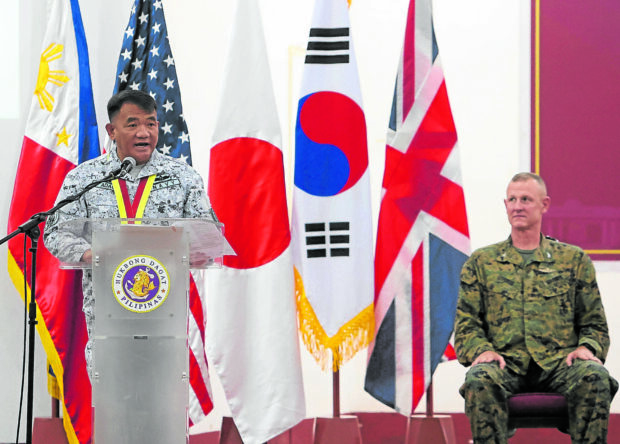PH getting 5 patrol ships with Japan aid

‘KAMANDAG’ 2 PLUS 3 US Marine rotational force commander Col. Thomas Siverts looks on as Philippine Navy chief Rear Adm. Toribio Adaci Jr. speaks at Thursday’s launch of the “Kamandag” military exercises at the Philippine Marines Headquarters in Taguig City. The drills run up to Nov. 20 and will have participants or observers also from the United Kingdom, South Korea and Japan. —MARIANNE BERMUDEZ
The Philippines is set to launch five coast guard vessels worth half a billion dollars through a Japanese government loan, a senior official said Thursday, to improve its patrol capability in disputed waters of the South China Sea.
Manila announced the project after a visit by Japanese Prime Minister Fumio Kishida, who pledged in a speech that Japan would “continue to contribute to the enhancement of the Philippines’ security capabilities.”
The Philippines has been upgrading its maritime security assets and boosting ties with allies to counteract China’s aggressive actions in the South China Sea, including areas disputed by the two neighbors.
Economic Planning Secretary Arsenio Balisacan told reporters the five 97-meter (318-foot) vessels will be delivered between 2027 and 2028, with funding worth P29.3 billion ($525 million) loaned from Tokyo.
“The project will enable the coast guard to secure important sea lines of communication in the West Philippine Sea,” among others, he said, using the Philippine name for its claimed areas in the South China Sea. “It will also help the Philippine Coast Guard combat illegal activities and enforce maritime laws in the Philippine waters.”
Article continues after this advertisementChina claims almost the entire South China Sea, through which trillions of dollars in trade passes annually, and has ignored a 2016 international ruling that its assertion has no legal basis.
Article continues after this advertisementBeijing deploys hundreds of coast guard and other vessels in the disputed waters to enforce its claim.
Japanese official development assistance has played a key role in upgrading the capability of the Filipino coast guard.
Tokyo in recent years has financed the acquisition of two of the agency’s 97-meter, and 10 of its 44-meter, patrol vessels.
During the Manila visit last week, Kishida also announced Tokyo will provide the Philippines with a coastal radar surveillance system.
He and Philippine President Ferdinand Marcos also agreed to start negotiations for a defense pact that would allow the countries to deploy troops on each other’s territory.